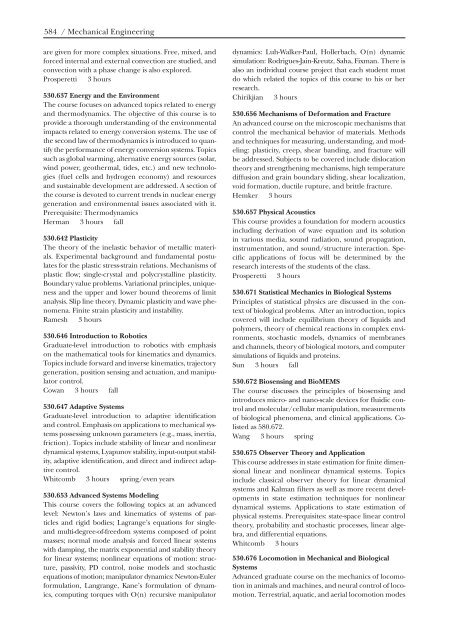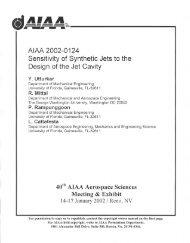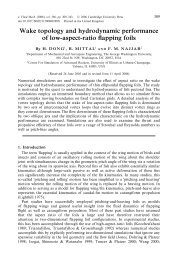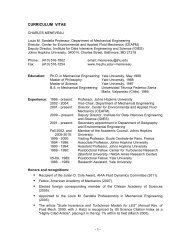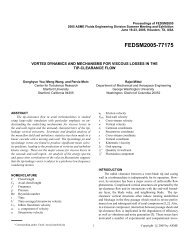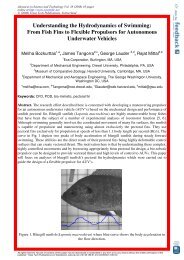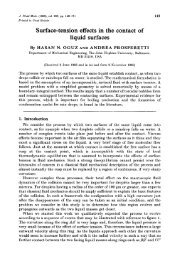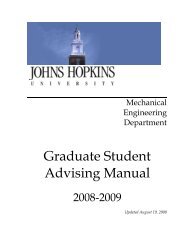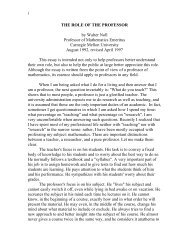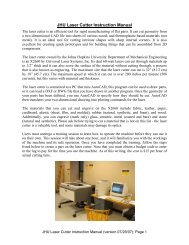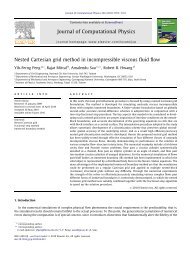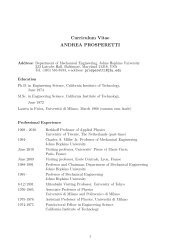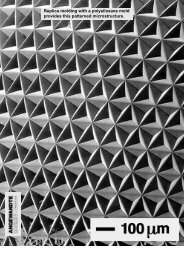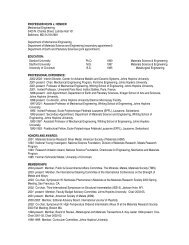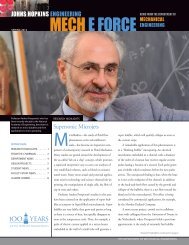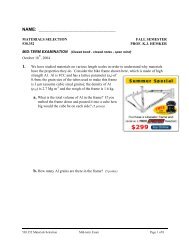Course Catalog - Mechanical Engineering - Johns Hopkins University
Course Catalog - Mechanical Engineering - Johns Hopkins University
Course Catalog - Mechanical Engineering - Johns Hopkins University
You also want an ePaper? Increase the reach of your titles
YUMPU automatically turns print PDFs into web optimized ePapers that Google loves.
584 / <strong>Mechanical</strong> <strong>Engineering</strong><br />
are given for more complex situations. Free, mixed, and<br />
forced internal and external convection are studied, and<br />
convection with a phase change is also explored.<br />
Prosperetti 3 hours<br />
530.637 Energy and the Environment<br />
The course focuses on advanced topics related to energy<br />
and thermodynamics. The objective of this course is to<br />
provide a thorough understanding of the environmental<br />
impacts related to energy conversion systems. The use of<br />
the second law of thermodynamics is introduced to quantify<br />
the performance of energy conversion systems. Topics<br />
such as global warming, alternative energy sources (solar,<br />
wind power, geothermal, tides, etc.) and new technologies<br />
(fuel cells and hydrogen economy) and resources<br />
and sustainable development are addressed. A section of<br />
the course is devoted to current trends in nuclear energy<br />
generation and environmental issues associated with it.<br />
Prerequisite: Thermodynamics<br />
Herman 3 hours fall<br />
530.642 Plasticity<br />
The theory of the inelastic behavior of metallic materials.<br />
Experimental background and fundamental postulates<br />
for the plastic stress-strain relations. Mechanisms of<br />
plastic flow; single-crystal and polycrystalline plasticity.<br />
Boundary value problems. Variational principles, uniqueness<br />
and the upper and lower bound theorems of limit<br />
analysis. Slip line theory. Dynamic plasticity and wave phenomena.<br />
Finite strain plasticity and instability.<br />
Ramesh 3 hours<br />
530.646 Introduction to Robotics<br />
Graduate-level introduction to robotics with emphasis<br />
on the mathematical tools for kinematics and dynamics.<br />
Topics include forward and inverse kinematics, trajectory<br />
generation, position sensing and actuation, and manipulator<br />
control.<br />
Cowan 3 hours fall<br />
530.647 Adaptive Systems<br />
Graduate-level introduction to adaptive identification<br />
and control. Emphasis on applications to mechanical systems<br />
possessing unknown parameters (e.g., mass, inertia,<br />
friction). Topics include stability of linear and nonlinear<br />
dynamical systems, Lyapunov stability, input-output stability,<br />
adaptive identification, and direct and indirect adaptive<br />
control.<br />
Whitcomb 3 hours spring/even years<br />
530.653 Advanced Systems Modeling<br />
This course covers the following topics at an advanced<br />
level: Newton’s laws and kinematics of systems of particles<br />
and rigid bodies; Lagrange’s equations for singleand<br />
multi-degree-of-freedom systems composed of point<br />
masses; normal mode analysis and forced linear systems<br />
with damping, the matrix exponential and stability theory<br />
for linear systems; nonlinear equations of motion: structure,<br />
passivity, PD control, noise models and stochastic<br />
equations of motion; manipulator dynamics: Newton-Euler<br />
formulation, Langrange, Kane’s formulation of dynamics,<br />
computing torques with O(n) recursive manipulator<br />
dynamics: Luh-Walker-Paul, Hollerbach, O(n) dynamic<br />
simulation: Rodrigues-Jain-Kreutz, Saha, Fixman. There is<br />
also an individual course project that each student must<br />
do which related the topics of this course to his or her<br />
research.<br />
Chirikjian 3 hours<br />
530.656 Mechanisms of Deformation and Fracture<br />
An advanced course on the microscopic mechanisms that<br />
control the mechanical behavior of materials. Methods<br />
and techniques for measuring, understanding, and modeling:<br />
plasticity, creep, shear banding, and fracture will<br />
be addressed. Subjects to be covered include dislocation<br />
theory and strengthening mechanisms, high temperature<br />
diffusion and grain boundary sliding, shear localization,<br />
void formation, ductile rupture, and brittle fracture.<br />
Hemker 3 hours<br />
530.657 Physical Acoustics<br />
This course provides a foundation for modern acoustics<br />
including derivation of wave equation and its solution<br />
in various media, sound radiation, sound propagation,<br />
instrumentation, and sound/structure interaction. Specific<br />
applications of focus will be determined by the<br />
research interests of the students of the class.<br />
Prosperetti 3 hours<br />
530.671 Statistical Mechanics in Biological Systems<br />
Principles of statistical physics are discussed in the context<br />
of biological problems. After an introduction, topics<br />
covered will include equilibrium theory of liquids and<br />
polymers, theory of chemical reactions in complex environments,<br />
stochastic models, dynamics of membranes<br />
and channels, theory of biological motors, and computer<br />
simulations of liquids and proteins.<br />
Sun 3 hours fall<br />
530.672 Biosensing and BioMEMS<br />
The course discusses the principles of biosensing and<br />
introduces micro- and nano-scale devices for fluidic control<br />
and molecular/cellular manipulation, measurements<br />
of biological phenomena, and clinical applications. Colisted<br />
as 580.672.<br />
Wang 3 hours spring<br />
530.675 Observer Theory and Application<br />
This course addresses in state estimation for finite dimensional<br />
linear and nonlinear dynamical systems. Topics<br />
include classical observer theory for linear dynamical<br />
systems and Kalman filters as well as more recent developments<br />
in state estimation techniques for nonlinear<br />
dynamical systems. Applications to state estimation of<br />
physical systems. Prerequisites: state-space linear control<br />
theory, probability and stochastic processes, linear algebra,<br />
and differential equations.<br />
Whitcomb 3 hours<br />
530.676 Locomotion in <strong>Mechanical</strong> and Biological<br />
Systems<br />
Advanced graduate course on the mechanics of locomotion<br />
in animals and machines, and neural control of locomotion.<br />
Terrestrial, aquatic, and aerial locomotion modes


